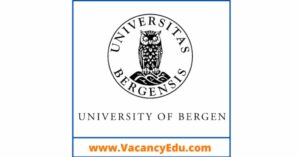University of Bergen, Bergen, Norway invites online Application for number of Fully Funded PhD Degree at various Departments. We are providing a list of Fully Funded PhD Programs available at University of Bergen, Bergen, Norway.
Eligible candidate may Apply as soon as possible.
(01) PhD Degree – Fully Funded
PhD position summary/title: PhD Research Fellow in Informatics (up to 3 positions)
Digitization of businesses, industry, public administration, and education makes informatics play an increasingly important role in the development of society. Research and education in informatics are crucial for the digital transformation of our society to succeed. The Department of Informatics contributes to this through eight research groups that deliver research and education at a high international level in algorithms, bioinformatics, information security, machine learning, optimization, programming theory, visualization and didactics. Our centers/labs Center for Data Science (CEDAS), Computational Biology Unit (CBU) and Energy Informatics Lab are important extensions of our research and education activities. The department offers education for the future at Bachelor, Master and PhD levels. The department is in rapid growth regarding its number of students, research directions, and employees. We have today about 1000 students, and 150 employees from over 35 countries, among which 37 are faculty and 50 PhD candidates.
Deadline : 1st December 2024
(02) PhD Degree – Fully Funded
PhD position summary/title: PhD Research Fellow in structural modeling for extra-large wind turbines
The MSCA Doctoral Network covers 4 key research aspects: 1) wind characteristics and resources, 2) aerodynamics, 3) structures, and 4) aeroelasticity. Twelve fellows will undertake individual projects in these areas. All the research questions in the project reflect industry needs. Academic novelty and innovation will be reflected in the methodologies and solutions. The research results will be disseminated directly to the public and scientific community. The outcomes are both technologies and a talent pool to accelerate the next generation of large-scale offshore wind power.
The NEXTgenT consortium has excellent coverage of academic universities and industry organizations including manufacturers, energy utilities, system operators, consultancy and technology innovation centers. Moreover, the MSCA Doctoral Network has mobility as one key aspect, the successful candidate is thus expected to spend secondments of several months duration with both industrial and academic partners during the PhD period.
Standard structural models for XL OWTs (extra-large offshore wind turbines) rely on linear finite elements that are corrected to accommodate stiffening/softening effects. Due to their exceptionally low computational cost and good predictive capabilities, these models are presently the industrial gold standard. However, OWTs are getting larger and structural responses will exhibit geometrical nonlinearities. Models to account for those nonlinearities do exist and are well developed but are not industry standard. The suitability of standard structural models for the aeroelastic analysis of XL OWTs will be investigated to determine where there is an unavoidable need for employing geometrically nonlinear formulations. Simulations for relevant load cases with standard and non-standard models will be carried out and the potential for improvement of the predictive capabilities by data assimilation will be investigated. Optimization problems to adjust the models to best suit the data sets will be formulated as well. The research activities associated to the position target also at a close collaboration with ongoing research at the BOW and GFI. It is expected that the results emerging from these research activities will be published in highly-ranked international journals.
Deadline : 14th November 2024
View All Fully Funded PhD Positions Click Here
(03) PhD Degree – Fully Funded
PhD position summary/title: PhD Research Fellow in analytical marine chemistry
The position is part of a strategic collaboration between UiB and IMR that focuses on knowledge for the ocean of the future with ongoing innovation and digital transition to artificial intelligence and implementation of future technologies. There will be a collaboration between the research group Bioresources and Pharmaceutical Chemistry at the Department of Chemistry, working with challenges related to health and sustainable use of marine bioresources by developing and applying both synthetic and analytical methods in organic chemistry, and the research group Contaminants and Biohazards at the Institute of Marine Research which among other focus areas investigates and document the levels of contaminants in the marine environment, biota, fish and seafood.
While there is continual work related to improving targeted analytical methods, at the same time there is increasing focus on using high-resolution mass spectrometry (HRMS) for the analysis of suspect and non-target screening for emerging contaminants, such as per- and polyfluoroalkyl substances (PFAS). HRMS generates large and complex datasets, providing new opportunities for deeper insights. In this position HRMS based methods will be applied to identify organic contaminates in seafood and marine samples from hotspot areas as well as marine organisms exposed to technical mixtures of contaminants. Additionally, effect-directed analysis will be used to prioritize emerging contaminants identified in impacted marine environments. The findings will be published in peer-reviewed journals and will contribute to the PhD thesis.
The PhD fellow will contribute to the following ongoing projects: NRC FEARLESS, EU CONTRAST and NRC ClimeSeafood as well as scientific governance support.
Deadline : 11th November 2024
(04) PhD Degree – Fully Funded
PhD position summary/title: MSCA RESCUER PhD Research Fellow in Applied and Computational Mathematics
The position is funded through the Horizon Europe project RESCUER which brings together 8 beneficiaries and 9 associated partners across 8 countries to train 10 doctoral candidates. These doctoral candidates will enjoy a multi-disciplinary and international environment with abundant training opportunities and exchange within the institutions involved in the network.
The main goal in the project connected to this position is to enable accurate and operational nearshore wave forecasting. To achieve sufficient accuracy, a time dependent model has to be solved which usually is prohibitively computationally costly for forecasts. By using advanced numerical methods, improved gridding techniques and modern computer architectures, the computational time will be reduced and allow for forecasting. The student will develop these numerical methods, implement them and demonstrate their efficacy.
Secondments (i.e. 3-6 month assignments with full pay) at an academic and an industrial partner institution are planned. The project also provides ample opportunities for professional exchange and networking with further academic and with industrial partners. Several short courses and summer schools will be organized by the network, and participation is expected. More info about the project and related positions in the Doctoral Network can be found here: https://www.rescuer-msca.net/recruitment
Deadline : 8th November 2024
(05) PhD Degree – Fully Funded
PhD position summary/title: PhD Research Fellow in Computational Mathematics
CO2 storage clusters have emerged as an attractive option for reaching the EU goals in CO2 storage because the existing storage projects are centralized around hubs to maximize injection into highly prospective regional aquifers. This approach is based on the economy of scale, where a shared transport infrastructure serves major industrial clusters that emit large quantities of CO2. Gigatonne-scale storage hubs that utilize regional aquifers are emerging in the North Sea (e.g., Horda Platform, Norway or Bunter Sandstone, UK) and in North America (Gulf of Mexico, USA). While being economically attractive, the cluster approach raises important questions about identifying and assessing technical or commercial risks.
The main objective of the project is to develop a fully integrated approach to assess geomechanical risks for gigatonne-scale storage clusters that connect the regional, project, and fault scales.
The PhD-candidate will contribute to the development, implementation and analysis of advanced multiscale simulation methods for geomechanics. The methods will be based on splitting, domain decomposition and will involve different discretization methods.
Deadline :6th November 2024
Polite Follow-Up Email to Professor : When and How You should Write
Click here to know “How to write a Postdoc Job Application or Email”
(06) PhD Degree – Fully Funded
PhD position summary/title: PhD Research Fellow in reservoir physics
Hydrogen is emerging as a crucial low-carbon energy carrier and the need for large-scale underground hydrogen storage (UHS) in geological formations is expected to play an important role for balancing the energy supply and demand. However, subsurface microorganisms can use the stored hydrogen gas as an electron donor, causing operational risks, gas loss, reduced gas quality, induced corrosion, and detrimental changes to reservoir properties. Hence, large-scale UHS deployment in porous reservoirs requires comprehensive and fundamental understanding of how and to what extent microbial processes affect storage sites, and the interplay between microbial, geochemical, and flow dynamics.
The PhD Research Fellow will be involved in the EU-funded project HyDRA – Diagnostic Tools and Risk Protocols to Accelerate Underground Hydrogen Storage. This project aims to perform research on and characterize microbial interactions in various European storage sites to assess potential risks during UHS. The HyDRA consortium has 9 international research partners and over 10 energy companies as partners. The PhD candidate will work in an interdisciplinary research team, focusing on using multiscale experimental methods to study microbial activity and biogeochemical reactions under dynamic hydrogen flow. The PhD student will collaborate with top-ranked international universities in the consortium and have opportunities for research exchanges. The PhD student will also collaborate on a regular basis with industry partners in the HyDRA project and take active part in a broad professional network in applied research.
Deadline : 3rd November 2024
(07) PhD Degree – Fully Funded
PhD position summary/title: PhD Research Fellow in seafood and sustainability.
Over time, IMR has built up a large database (Seafood data) on the content of nutrients and contaminants in various seafood. The aim of this project is to develop quantitative and qualitative parameters related to different sustainability dimensions that can supplement data on safe and healthy food with indicators of relevance.
The project is a pioneering project at IMR, where collaboration with various professional groups and research fields, both internally at IMR and UiB, but also in collaboration with others, is essential.
Deadline : 1st November 2024
(08) PhD Degree – Fully Funded
PhD position summary/title: PhD Research Fellow in Fish Immunology
Viral diseases present as great a challenge to fish as to humans – and it is difficult to make efficient vaccines protecting against viral diseases whether for humans or fish. Farmed fish are at particular risk for viral diseases due to intensive rearing practices and high stocking densities. More effective vaccines than those currently available can contribute to reduced mortality among the fish and thus contribute to several of the UN’s sustainability goals, including goal no. 2 which is to eradicate hunger. In this PhD project, we will develop an mRNA vaccine for salmon. We will tailor the vaccine for salmon, optimize the individual components of the vaccine and investigate how the salmon’s immune system responds after vaccination. Various methods such as in vitro transcription, cell and transfection work, flow cytometry, immunostaining, cloning, isolation of leukocytes and in vitro infection, vaccine trials and measurement of immune responses by ELISA and qPCR will be used in this study.
This project is based on work in Haugland’s research group where we have established protocols for making mRNA tailored for salmon. We have performed the first vaccine trials with an mRNA vaccine. The candidate will work in a busy and engaging research environment with postdocs other PhDs, as well as master and bachelor students.
Deadline : 1st November 2024
Click here to know “How to Write an Effective Cover Letter”
(09) PhD Degree – Fully Funded
PhD position summary/title: PhD Research Fellow in Tectonics, Climate and Sedimentation
The project will focus on the interaction between tectonics, climate and sedimentation at different temporal and spatial scales on the UK-Norwegian continental shelf using 3D seismic and well data. The research will involve:
- The use of regional seismic datasets to map key seismic surfaces to develop a seismic stratigraphic framework for the Paleocene-early Eocene of the Moray Firth. Within this stratigraphic framework, the project will interpret seismic facies and seismic geomorphology, calibrated by well logs, core and biostratigraphic data to constrain the evolution of depositional systems.
- Use numerical models to test different landscape evolution scenarios and investigate the role of different tectonic processes on erosion and sedimentation.
- Interact with industry geoscientists at Equinor.
- Presentation of results at international conferences.
- Production of written reports and publication of results in major geoscience journals.
Deadline : 1st November 2024
About University of Bergen, Bergen, Norway- Official Website
The University of Bergen (Norwegian: Universitetet i Bergen, Urban East Norwegian: [ʉnɪvæʂɪˈtèːtə ɪ ˈbæ̀rɡn̩]) is a research-intensive state university located in Bergen, Norway. The university today has over 4,000 employees and 18,000 students. It was established by an act of parliament in 1946 based on several older scientific institutions dating back to 1825, and is Norway’s second oldest university. It is considered one of Norway’s four “established universities” and has faculties and programmes in all the fields of a classical university including fields that are traditionally reserved by law for established universities, including medicine and law. It is also one of Norway’s leading universities in many natural sciences, including marine research and climate research. It is consistently ranked in the top one percentage among the world’s universities, usually among the best 200 universities[2] and among the best 10 or 50 universities worldwide in some fields such as earth and marine sciences. It is part of the Coimbra Group and of the U5 group of Norway’s oldest and highest ranked universities.
Disclaimer: We try to ensure that the information we post on VacancyEdu.com is accurate. However, despite our best efforts, some of the content may contain errors. You can trust us, but please conduct your own checks too.
Related Posts
- PhD Degree (34)-Fully Funded at Loughborough University, Leicestershire, England

- PhD Degree (15)-Fully Funded at University of Southern Denmark, Denmark

- PhD Degree (24)-Fully Funded at Forschungszentrum Julich, Germany

- PhD Degree (08)-Fully Funded at Vrije University Amsterdam, Netherlands

- PhD Degree (27)-Fully Funded at Nottingham Trent University (NTU), England

- PhD Degree (24)-Fully Funded at University of Oslo, Norway

- PhD Degree (04)-Fully Funded at Masaryk University, Czech Republic

- PhD Degree (29)-Fully Funded at University of Oslo, Norway

- PhD Degree (13)-Fully Funded at University of Stavanger, Norway










